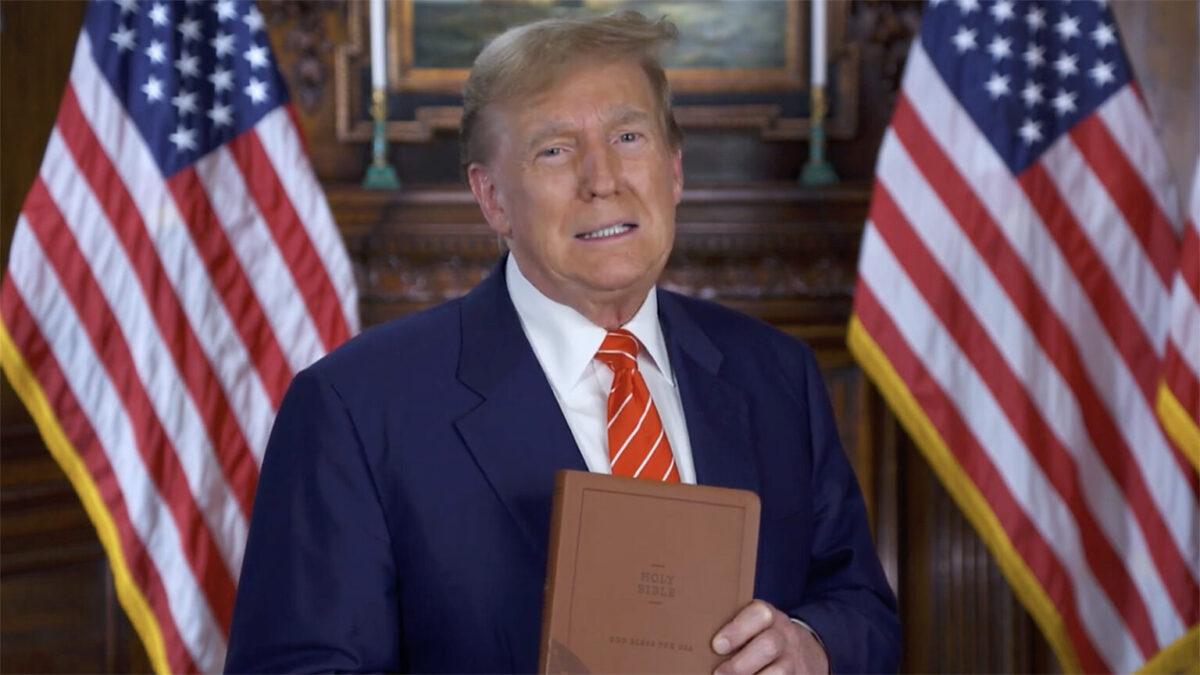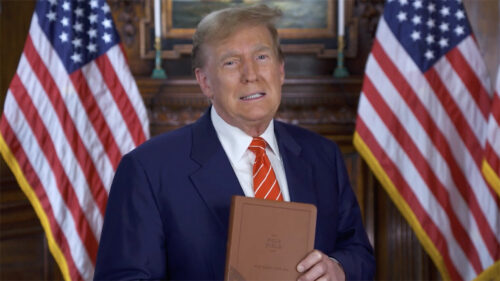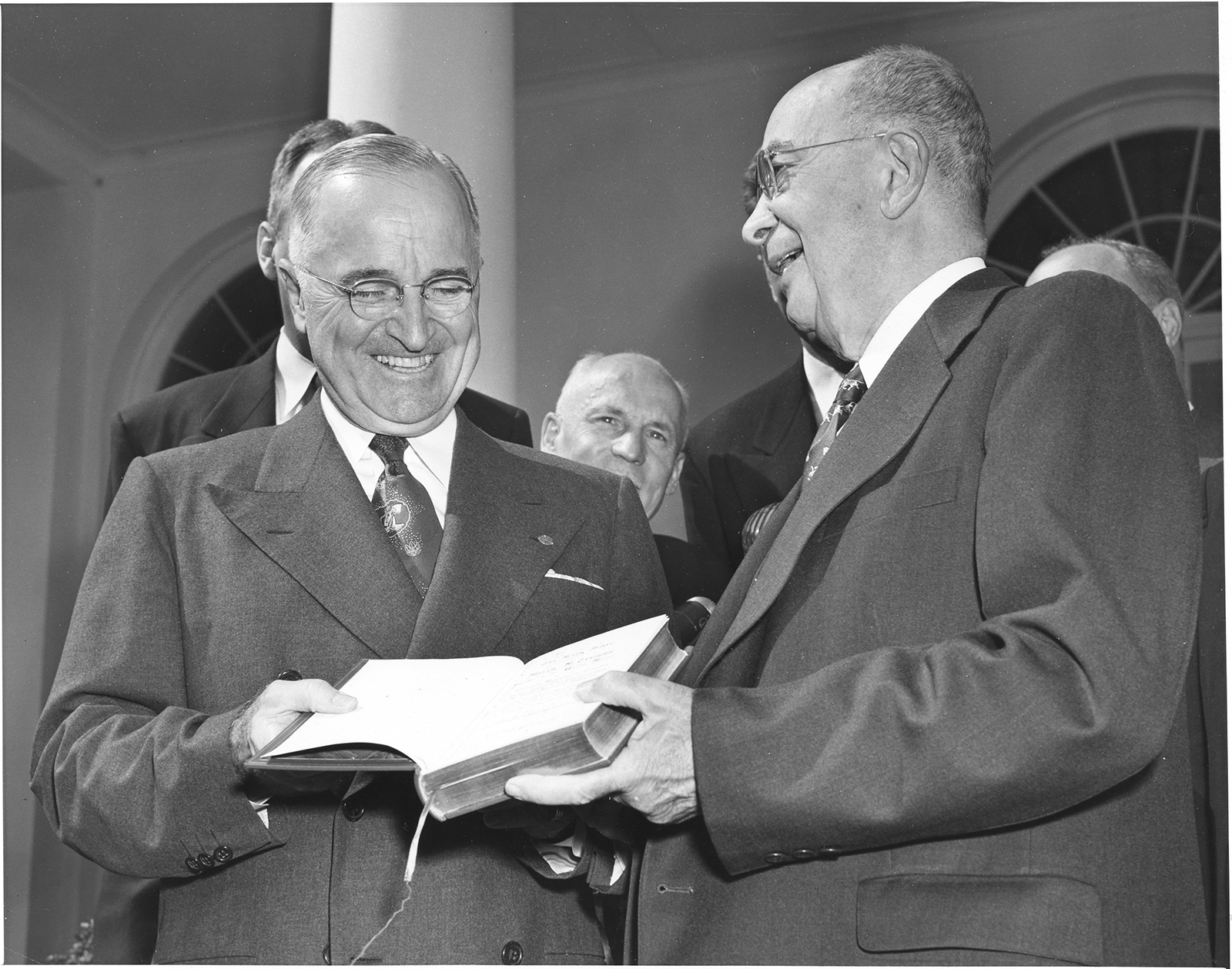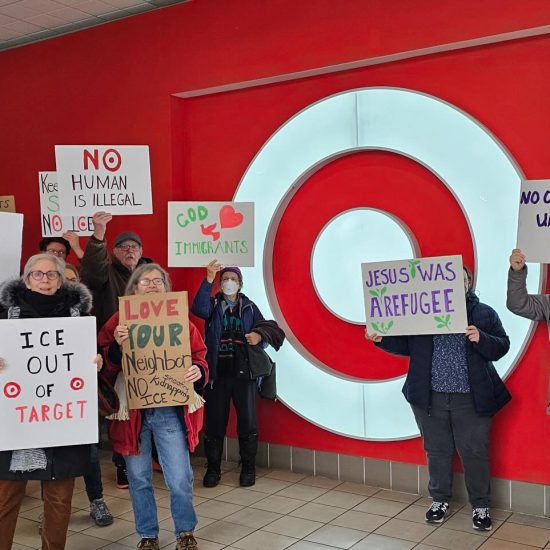
NAPERVILLE, Ill. (RNS) — Jim Wallis and Donald Trump believe in their own ways that the Bible can save America.
Trump, who recently endorsed Lee Greenwood’s “God Bless the USA Bible,” a book that combines the King James Version with the U.S. Constitution and Declaration of Independence, has characterized the Christian Scripture as both a symbol of power and a sign to his followers that their way of life is under threat.

Former President Donald Trump endorses the “God Bless the USA” Bible in a recent YouTube video. (Video screen grab)
“We must make America pray again,” the former president said in a YouTube and social media promotional video released in Holy Week.
For Wallis, the evangelical Christian minister and longtime social justice activist, the Bible’s substance, not its symbolism, holds the power to address America’s ills and save democracy. Speaking at a suburban Chicago bookstore on Monday (April 8), Wallis quoted a passage from the Book of Genesis that claims all human beings are made in God’s image. As such, he said, any attack on democracy is an attack on something holy.
Wallis agrees that American democracy is in crisis and needs to be saved, but it won’t be accomplished by Americans giving in to their “worst demons” and tearing each other apart.
“We need to go deeper than politics,” he told the 20 or so people who had come out to hear him talk about his new book, “The False White Gospel.” The book turns to a series of biblical stories — from Genesis’ creation account to the parable of the good Samaritan — largely calling to end the polarization and fear that divide the country.
Despite the decline of organized religion, faith, and politics still make a volatile combination in a country where the Republican candidate, a thrice-divorced former reality TV star with a history of sexual misconduct, is running as a defender of the Christian faith.
That fact was apparent in the past few weeks as Wallis’ book tour has taken him to cable news shows, yielding segments remarkable for their ardent questions about the meaning of Christianity, not from the evangelical Christian minister and longtime social justice activist, but from his hosts. The day after Easter, Joe Scarborough of MSNBC’s “Morning Joe” expressed exasperation as he asked Wallis about Trump’s followers: “Why do they have to embrace a failed reality TV host and take him on as the other Jesus, their new savior?”
Joy Reid, host of “The ReidOut,” another MSNBC show, called Trump’s Bible pitch blasphemy. “To Donald Trump, a Bible is no more sacred than a Trump board game. Or Trump water. It’s just another cheap tchotchke to sell to his followers.”
The Rev. Amanda Henderson, director of the Institute for Religion, Politics & Culture at the Iliff School of Theology in Denver and host of the “Complexified” podcast, said Trump is one of a long line of politicians and leaders in history who understand the power of religion as political tool.
“At a time when so many people feel a sense of loneliness or disconnection, he is tapping into the desire we all have to be part of something bigger,” she said. “We can’t dismiss that underlying need that people have to feel a sense of connection and belonging and to be a part of something bigger than themselves.”
Even as some religious leaders oppose Trump’s use of faith, said Henderson, they can’t afford to cede the discussion of faith to the candidate. The outrage expressed by Reid, Scarborough, and others shows that the debate has spread beyond clergy to liberal Christians in the media and other sectors.
Brian Kaylor, co-author of “Baptizing America,” a forthcoming book about mainline Protestants’ role in promoting “God and country” patriotism, said that, as a result, religion has become one more thing tearing the country apart.

President Harry S. Truman, left, accepts a new Revised Standard Version of the Bible from Dean Emeritus of the Yale Divinity School, Luther A. Weigle, right, in a Rose Garden ceremony at the White House on Sept. 26, 1952. Weigle gave the book on behalf of the National Council of Churches as the chairman of the American Standard Bible Committee. Fifteen years of labor by 32 Protestant scholars went into the crafting of the RSV Bible, which was written in contemporary language. (Photo by United Press Associations. Harry S. Truman Library)
That was not always the case, said Kaylor. In the 1950s and 1960s, Americans rallied to a broad, consensual civil religion, reflected in the adoption of “In God We Trust” as the national motto and to add “Under God” to the Pledge of Allegiance. When translators of one of the most popular English translations of the Bible, the Revised Standard Version, finished their work after 15 years on the job, Kaylor pointed out, they presented President Harry Truman with a commemorative copy of the new translation in a Rose Garden ceremony.
At the time, 90% of Americans were Christians and largely viewed religion in a positive light, said Kaylor. Today, 80% of Americans say religion’s influence is on the decline, according to a new poll, while more than half of Americans rarely or never darken a church door.
“Civil religion worked in the 1950s and 1960s,” said Kaylor. “It no longer works today.”
Calvin University history professor Kristin Du Mez said the “God Bless the USA Bible” is an attempt to fire up those who remain devoted, though even the number of evangelical Christians is declining. “He’s going to need every one of those evangelical votes,” Du Mez said.
But Trump may be appealing to “comfort food Christian Nationalism,” a version of “God and country” patriotism familiar to older Christian voters who remember the heyday of civil religion. “It was this more inclusive kind of Christian America — though if you weren’t Christian you just had to be quiet and go along,” said Du Mez.
In Trump’s hands, that idea has been turned into a weapon, with Trump’s Christian followers portrayed as the “real Americans” pitted against not only non-Christians but Christians who don’t share their political views. “You are either for us or against us,” said Du Mez, author of “Jesus and John Wayne.”
In this sense, Trump is trying to turn a bygone Christian consensus into a source of power, a message he made plain earlier this year at a meeting of evangelical Christian broadcasters in Nashville, Tennessee, telling them, “If I get in, you’re going to be using that power at a level that you’ve never used before.”
Tobin Miller Shearer, a professor of history at the University of Montana, points out that civil religion appealed to faith in defense of democracy. Trump, Shearer argued in a recent essay, is instead using God to motivate people to undermine democracy. “Regardless of the outcome of the 2024 election, the switch from historical claims of divine authority for democracy to divine authority to challenge democracy is already obvious and apparent,” he said.
Princeton historian Kevin Kruse, author of “One Nation Under God,” a study of Eisenhower-era “God and country” politics, said some of Trump’s supporters may still recall that earlier version of civil religion and long for that era, even if the former president has a different goal in mind.
When they hear “One nation, under God,” that means “We are all in this together,” Kruse said. “Not — if you don’t toe the line, you are out.”
Those who see Christianity as important to many Americans are exasperated at the gap between those teachings and the rise of Trump, said NPR political correspondent Sarah McCammon, even those who don’t embrace the Bible or Christianity but know its teachings.
McCammon, whose book “The Exvangelicals” was prompted by her experiences covering Trump’s 2016 campaign and his surprising hold on evangelicals, said that she often gets asked, “How can Christian people think that this is what Christianity is all about?”
“I don’t think most white evangelicals are supporting Trump because they think he’s a devout Christian,” she said. “It’s not because they think Trump is one of them. It’s because they think he will be a champion for them. That distinction is really critical.”
Even if many Americans no longer read the Bible — Trump’s endorsed version or any other — Christianity is still embedded for many in what it means to be an American. And it remains a force in American culture, said McCammon.
“Flannery O’Connor talked about how Christ-haunted the South was,” she said, referring to the mid-20th-century novelist from Georgia. “In a way, Christ has haunted America. We can’t get away from that history.”
For his part, Wallis said he is still hopeful about America’s future. During his bookstore talk, he spoke of the short-term goal of saving democracy. But the bigger goal, he said, is to transform the nation into the kind of inclusive community Christians — and all Americans — can share.
Hope is needed to make that possible, he said, turning to the New Testament Book of Hebrews. Faith, he said in quoting that book, “is the substance of things hoped for, the evidence of things not seen.”
(This story was reported with support from the Stiefel Freethought Foundation.)






